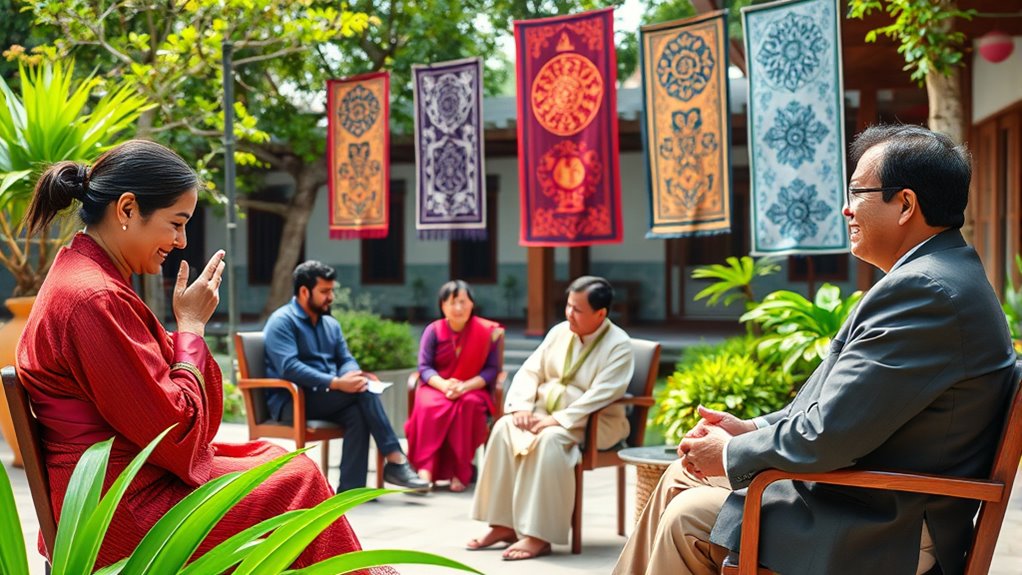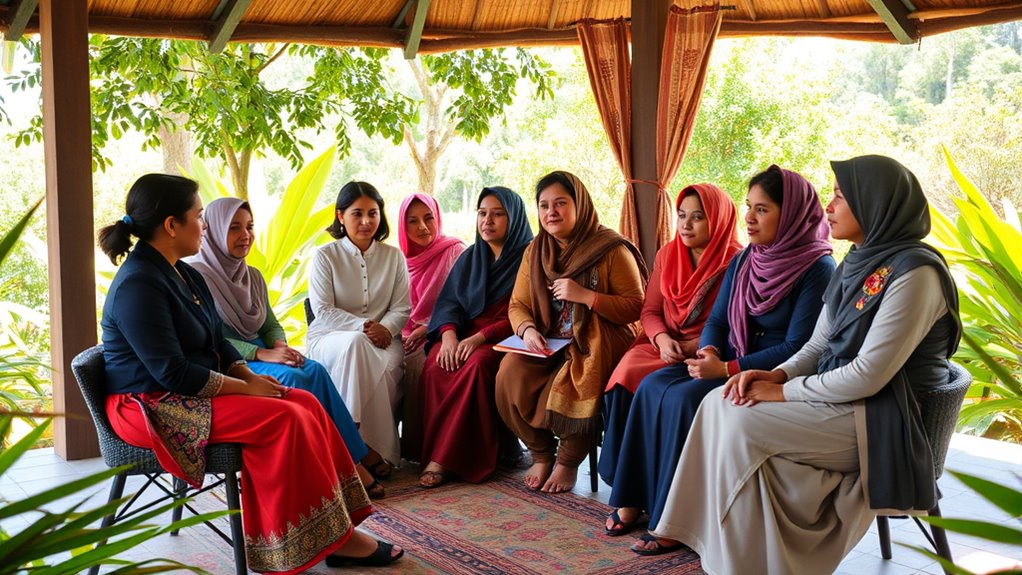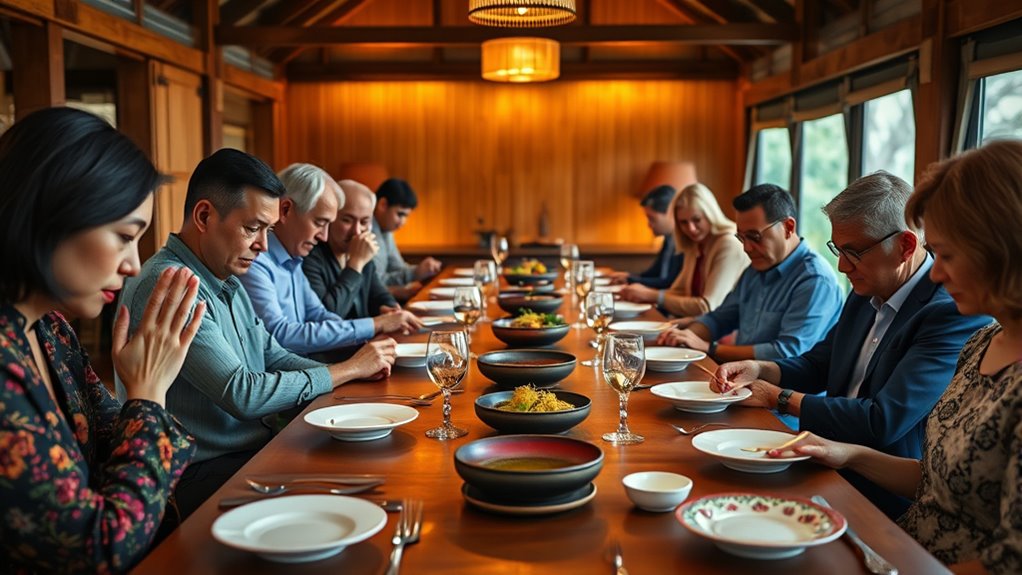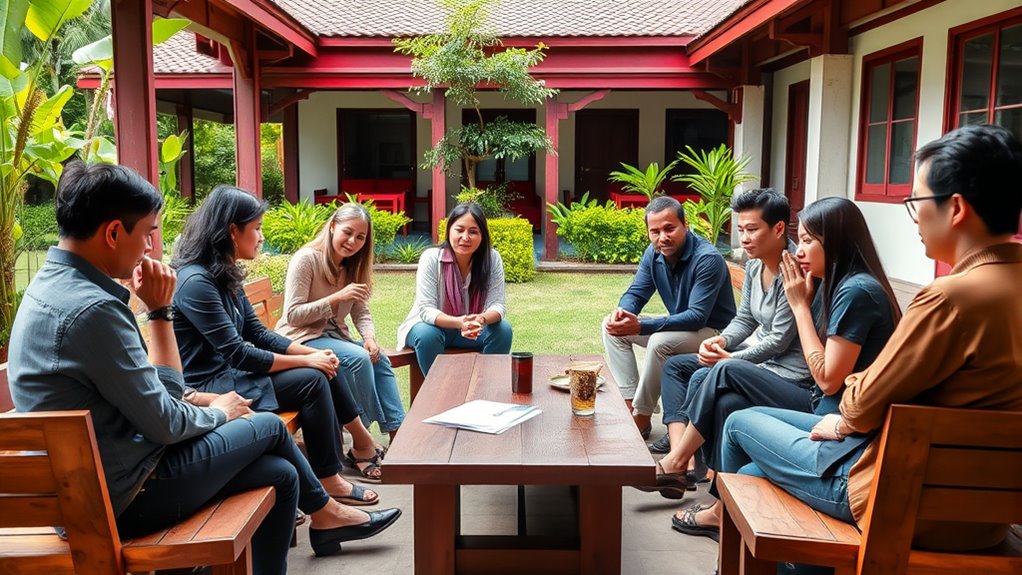When participating in a remote work retreat across cultures, you should respect diverse norms, values, and communication styles. Observe dress codes, meal customs, and personal space sensitivities, and adapt your behavior accordingly. Be punctual and respectful, using polite language and non-verbal cues to foster trust. Understanding holiday observances and handling conflicts gently also helps. If you want to guarantee smooth interactions, exploring the key aspects of cultural etiquette will give you valuable tips for a successful retreat.
Key Takeaways
- Respect and adapt to diverse cultural norms, including communication styles, dress codes, and social customs, to foster inclusivity.
- Learn basic greetings and non-verbal cues in participants’ languages and cultures to enhance mutual understanding.
- Follow local etiquette for meals, gift exchanges, and personal space to demonstrate respect and build relationships.
- Be punctual or flexible based on cultural expectations, and communicate clearly to prevent misunderstandings.
- Show sensitivity to cultural symbols, traditional attire, and artforms, avoiding behaviors that could cause disrespect or offense.
Understanding Cultural Norms and Values

Understanding cultural norms and values is essential when participating in remote work retreats, as these factors influence how team members communicate, collaborate, and show respect. Recognizing cultural stereotypes helps you avoid assumptions that can lead to misunderstandings. For example, believing certain behaviors are universal may cause cross-cultural misunderstandings, creating tension or miscommunication. By learning about each other’s backgrounds, you can foster a more inclusive environment. Respecting differences in communication styles, decision-making, and social etiquette ensures everyone feels valued. Being aware of potential stereotypes allows you to approach interactions with openness rather than bias. Additionally, understanding the importance of diversification in investments can help team members appreciate different approaches to problem-solving and risk management. Ultimately, understanding these norms supports smoother collaboration, prevents conflicts, and helps build stronger, more respectful relationships during your remote work retreat.
Communicating Respectfully Across Cultures

When communicating across cultures, you need to be mindful of your language and how it might be received. Pay attention to nonverbal cues to avoid misunderstandings, and adapt your style to match others’ preferences. Respecting different communication approaches helps build trust and fosters effective collaboration. Recognizing cultural nuances can further improve your interactions and understanding.
Mindful Language Use
To communicate respectfully across cultures during remote work retreats, you need to pay close attention to your language choices. Use respectful terms, avoid slang, and be mindful of cultural sensitivities. When discussing cultural cuisine or traditional music, choose words that honor local traditions without stereotyping. Show genuine interest by asking questions rather than making assumptions. Be aware that certain phrases or jokes may have different meanings or connotations elsewhere. Here are some tips to keep in mind:
- Use inclusive language that respects cultural differences
- Avoid making stereotypes about cultural cuisine or traditional music
- Listen actively and ask respectful questions to deepen understanding
- Recognize the importance of cultural sensitivity to foster respectful communication.
Understanding Nonverbal Cues
Have you ever noticed that gestures or facial expressions can mean very different things across cultures? Recognizing these nonverbal cues is essential for respectful communication during remote work retreats. Gesture recognition helps you interpret body language accurately, avoiding misunderstandings. For example, a thumbs-up might be positive in one culture but offensive in another. Similarly, facial expressions convey emotions and attitudes, but their meanings can vary widely. A nod may signify agreement in some countries, while in others, it could mean uncertainty. Paying close attention to these cues allows you to respond appropriately, fostering trust and rapport. Being aware of cultural differences in nonverbal communication ensures you communicate respectfully across diverse teams, making your remote retreat more inclusive and effective. Additionally, understanding privacy and cookie usage can help you better navigate online interactions during virtual meetings.
Respecting Communication Styles
Understanding and adapting to different communication styles is essential for showing respect across cultures during remote work retreats. You’ll encounter varied ways people express themselves, so be mindful of language barriers and cultural humor, which can sometimes lead to misunderstandings. To communicate respectfully:
- Avoid relying solely on humor that might not translate well across cultures.
- Be patient and clarify when language barriers cause confusion.
- Observe how others communicate and mirror respectful styles.
- Recognizing best anime movies can also serve as a cultural touchpoint and facilitate friendly interactions.
Dress Code Expectations and Sensitivities

When it comes to dress code, you should be aware of different cultural norms to show respect. Decide whether to wear formal or casual attire based on the setting, and avoid outfits that could be seen as culturally insensitive. Being mindful of these details helps create a comfortable and respectful environment for everyone. Paying attention to cultural significance in clothing choices can further demonstrate your understanding and appreciation of diverse traditions.
Cultural Dress Norms
Cultural dress norms can be highly influential in how your team is perceived during remote work retreats, so it’s vital to respect local expectations. Understanding local dress codes helps you avoid unintentional disrespect and shows your appreciation for their traditions. In some cultures, traditional music and cultural artforms influence clothing choices, emphasizing modesty or specific colors. To navigate these norms effectively:
- Wear modest attire that aligns with local customs, especially during cultural events or formal gatherings.
- Avoid clothing that mimics traditional music costumes or cultural artforms unless explicitly invited to do so.
- Be mindful of accessories or symbols that hold cultural significance, ensuring you don’t inadvertently offend.
- Recognizing cultural dress norms and incorporating respectful attire demonstrates your awareness and sensitivity to local traditions.
Formal vs. Casual Attire
Deciding between formal and casual attire during remote work retreats depends on the event’s purpose, location, and local expectations. If the retreat emphasizes relaxed networking or team-building activities, casual dress or informal attire is usually appropriate. However, if the event includes formal presentations or client meetings, dressing more professionally becomes necessary. It’s essential to understand the cultural norms of the host country or organization to avoid misinterpretation. When in doubt, lean toward neat, comfortable clothing that balances professionalism and ease. Remember, dressing too casually might seem disrespectful in some settings, while overly formal attire can be out of place in informal environments. Clarify dress code expectations beforehand to ensure you’re appropriately dressed and show respect for local and organizational standards.
Avoiding Cultural Insensitivity
To avoid causing offense or misunderstandings, it’s essential to familiarize yourself with the dress code expectations and sensitivities of the host country or organization before the retreat. Respect cultural taboos by choosing appropriate attire and avoiding revealing or provocative clothing. Be mindful of humor sensitivity—what’s funny in one culture might be offensive in another. Here are some key points to keep in mind:
- Research local cultural taboos related to dress and behavior
- Avoid clothing that could be seen as disrespectful or inappropriate
- Be cautious with jokes or humor that could be misunderstood or offend
- Develop cultural intelligence (CQ) to better understand and navigate diverse cultural norms
Taking these steps helps foster respect and prevents unintentional insensitivity, ensuring a successful and harmonious retreat experience.
Dining Etiquette and Meal Customs

Understanding dining etiquette and meal customs is essential to show respect and build rapport during remote work retreats. You should observe proper table manners, such as sitting up straight and keeping elbows off the table, to demonstrate politeness. Pay attention to utensil etiquette by using utensils correctly and starting from the outside when multiple courses are served. In some cultures, passing dishes politely or waiting for the host to begin eating is expected. Avoid rushing through meals or interrupting conversations. If you’re unsure about specific customs, observe others or discreetly ask for guidance. Showing awareness of local dining practices fosters positive interactions and helps you avoid unintentional offense, creating a comfortable environment for everyone involved. Being mindful of cultural differences and adapting your behavior accordingly can greatly enhance the overall experience and respect among colleagues.
Meeting and Greeting Protocols

When meeting colleagues at remote work retreats, it’s important to follow appropriate greeting protocols to make a positive first impression. Cultural presentations can influence how greetings are exchanged, so be mindful of local customs. Language barriers might also affect communication, so a simple, respectful approach works best. To navigate these differences:
- Learn basic greetings in your colleagues’ languages to show effort
- Use non-verbal cues like a warm smile or a nod if language barriers exist
- Respect local customs, such as bowing or handshakes, based on cultural presentations
- Recognizing patterns in numbers can help you understand the underlying messages of diverse cultural norms.
Punctuality and Time Management Styles

Punctuality and time management styles vary widely across cultures, so it’s essential to recognize these differences during remote work retreats. Some cultures value strict punctuality and high time awareness, expecting everyone to arrive on time and adhere closely to schedules. Others have more relaxed punctuality standards, where being a few minutes late is acceptable. Understanding these differences helps prevent misunderstandings and shows respect for your colleagues’ cultural norms. Be mindful of how your team perceives time—whether it’s a rigid schedule or flexible approach—and adjust your behavior accordingly. Clear communication about meeting times and expectations can bridge gaps in punctuality standards. By respecting diverse time management styles, you foster a more inclusive and productive retreat environment.
Gift-Giving and Personal Space Norms

When it comes to gift-giving, understanding its cultural significance helps you choose meaningful presents that show respect. Respect personal space boundaries to avoid making others uncomfortable, especially in unfamiliar settings. Knowing which gifts are appropriate guarantees your gestures are appreciated and culturally sensitive.
Gift-Giving Cultural Significance
Gift-giving customs often reflect a culture’s values and social norms, influencing how you show appreciation or build relationships during a remote work retreat. Engaging in cultural gift exchange shows respect and understanding of local traditions. Recognizing gift giving traditions helps avoid misunderstandings and fosters goodwill. Different cultures have unique expectations about appropriate gifts, timing, and presentation.
- Be aware of whether gifts should be unwrapped publicly or privately
- Understand if monetary gifts are appropriate or considered impolite
- Know if specific items or symbols hold special significance
Personal Space Boundaries
Understanding personal space boundaries is essential during remote work retreats, especially when engaging in cultural exchanges like gift-giving. Respecting physical boundaries helps you avoid discomfort or misunderstandings. Different cultures have varying norms for personal space; some prefer close proximity, while others value more distance. Pay attention to cues and adjust your behavior accordingly. Here’s a quick guide:
| Culture | Personal Space Norms |
|---|---|
| Western countries | Generally prefer larger physical boundaries |
| East Asia | Smaller personal space, close proximity |
| Middle East | Warm, close personal boundaries |
| Europe | Varies, often moderate distances |
| Latin America | Comfortable with close physical boundaries |
Appropriate Gift Choices
Choosing appropriate gifts during remote work retreats requires sensitivity to cultural norms, especially in relation to personal space. When selecting presents, consider items that reflect respect and appreciation for your hosts. Avoid overly personal or expensive gifts that might invade personal space or create discomfort. Instead, opt for thoughtful tokens like local cuisine or traditional crafts, which showcase cultural pride without overstepping boundaries.
- Bring local cuisine that highlights regional flavors and traditions
- Gift traditional crafts that embody local artistry and heritage
- Avoid gifts that may be too personal or overly extravagant
Language Considerations and Non-Verbal Cues

When participating in remote work retreats, paying attention to language considerations and non-verbal cues is essential for effective communication. Language barriers can hinder understanding, so use translation tools when needed to clarify messages. Be mindful of non-verbal cues, such as gestures, facial expressions, and posture, which vary across cultures and can convey different meanings. Maintain eye contact where appropriate, but recognize that cultural norms influence comfort levels. Speak clearly and avoid slang or idiomatic expressions that might not translate well. Listening actively and asking for clarification shows respect and guarantees mutual understanding. By staying attentive to language differences and non-verbal signals, you foster a more inclusive and productive environment during your remote retreat.
Navigating Religious and Cultural Holidays

Understanding religious and cultural holidays requires awareness and sensitivity, especially during remote work retreats where participants may observe different traditions. Respecting holiday gift exchanges shows your consideration, while understanding religious attire customs demonstrates cultural appreciation. To be considerate:
Being mindful of religious and cultural holidays fosters respect and inclusivity during remote work retreats.
- Avoid scheduling events during major religious festivals unless participants are consulted.
- Be mindful of gift exchange practices, which may vary across cultures.
- Respect religious attire customs, such as head coverings or specific dress codes, during virtual meetings or shared activities.
Handling Conflicts and Misunderstandings Respectfully

Respecting cultural differences during remote work retreats also involves handling conflicts and misunderstandings with care. Building interpersonal trust is key to effective conflict resolution. When disagreements arise, stay calm and listen actively to understand different perspectives. Acknowledge feelings without judgment and aim to find common ground. Use this table to navigate cultural sensitivities:
| Situation | Suggested Approach |
|---|---|
| Misinterpreted words | Clarify intentions gently, avoid assumptions |
| Different communication styles | Adapt and be patient, respect tone differences |
| Time zone misunderstandings | Confirm schedules politely, show flexibility |
| Perceived disrespect | Address privately, seek understanding |
| Overlooked customs | Apologize sincerely, learn for next time |
Handling conflicts respectfully cultivates trust and ensures a harmonious retreat.
Frequently Asked Questions
How Should I Adapt My Humor to Different Cultural Sensitivities?
When considering humor sensitivity and cultural humor, you should always be mindful of diverse perspectives. You can adapt your humor by observing how others respond and avoiding jokes that might be offensive or misunderstood. It’s best to keep humor light, inclusive, and respectful, especially in multicultural settings. Asking questions or seeking guidance can also help you navigate cultural differences smoothly, ensuring your humor brings people together rather than causing discomfort.
What Are the Best Ways to Build Trust Across Diverse Cultures?
Sure, building trust across diverse cultures sounds simple—just wave a magic wand, right? In reality, it’s about mastering cross-cultural communication and practicing trust-building strategies like active listening, showing genuine respect, and being patient. You should tailor your approach to each culture, avoid assumptions, and stay open-minded. By demonstrating consistency and empathy, you’ll find that trust naturally grows, even when cultural differences seem like a mountain of obstacles.
How Do I Handle Cultural Taboos Diplomatically?
When handling cultural taboos diplomatically, you should prioritize respectful communication and awareness of potential cultural misunderstandings. Approach sensitive topics with tact, listen actively, and avoid assumptions. If you’re unsure, ask polite questions to clarify cultural norms and show genuine respect. This illustrates your openness and helps prevent misunderstandings, fostering a respectful environment where everyone feels valued and comfortable sharing their perspectives.
Are There Specific Gestures to Avoid in Certain Cultures?
When it comes to gestures, you should always practice gesture awareness to respect cultural boundaries. In some cultures, pointing with your finger or using certain hand signals can be offensive. Avoid crossing your arms or making exaggerated gestures, as these might be misinterpreted. Research specific customs beforehand and observe how locals communicate. Being mindful of these nuances helps you stay respectful and avoid unintentional misunderstandings during your interactions.
How Can I Learn Basic Phrases in Participants’ Languages Effectively?
Getting the hang of basic phrases in participants’ languages can open many doors. To make language learning easier, use apps like Duolingo or Memrise, which focus on practical cultural phrases. Practice regularly, listen to native speakers, and don’t be afraid to make mistakes — it’s the best way to learn. Remember, every effort counts, and showing genuine interest leaves a lasting impression.
Conclusion
By embracing these cultural nuances, you create an environment where everyone feels valued and comfortable. When you approach differences with genuine curiosity and respect, you gently open doors to richer connections and smoother collaborations. Remember, a little awareness goes a long way in avoiding unintended missteps. So, as you navigate your remote work retreat, let kindness and understanding be your guiding lights—sometimes, a soft touch can make all the difference in building lasting bonds.









